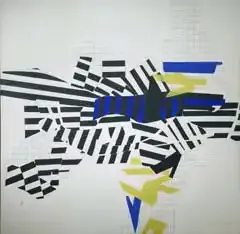
Tranquil Power:
The Art of Perle Fine
Emily Lowe Gallery
and
Perle Fine and Friends:
An Intimate Portrait by Maurice Berezov
David Filderman Gallery
April 7 - June 26, 2009
In conjunction with this exhibition, the Hofstra University Museum and the Hofstra Cultural Center are presenting a symposium, Perle Fine and Early Leaders of Abstract Expressionism, on April 24 and 25, 2009. Click here for a PDF of the Registration Program.
Perle Fine (1905-1988) was one of the few women artists in the inner circle of the Abstract Expressionism movement. She moved from Boston to New York in the late 1920s to study art. Kimon Nicolaides was her mentor at The Art Students League. By the late 1930s, she attended Hans Hofmann's studio sessions. Fine soon became an active member of the New York School. Championed by Baroness Hilla Rebay and the S.R. Guggenheim Foundation, Fine also interacted with the American Abstract Artists group, where she met Piet Mondrian. As her work developed into a more forceful and expressive abstraction, she was honored with solo exhibits at the galleries of Karl Nierendorf, Marian Willard and Betty Parsons. In 1950, Willem de Kooning sponsored her membership in the Artist's Club. She participated in the seminal 9th Street Show of 1951, and was included in all five New York Annuals of the 1950s. In the mid-1950s, Fine built a studio in Springs, Long Island, near friends and colleagues Lee Krasner and Jackson Pollock, becoming a member of a sparse but ultimately enduring artistic community.
As the organizing venue for this traveling exhibition, Hofstra University Museum is proud to showcase the work of Perle Fine. A prolific artist intent on exploring her own personal abstract language in a variety of media, Fine moved her studio to the East End of Long Island when she was in her artistic prime. She was an influential faculty member in the Fine Arts Department at Hofstra University from 1962 to 1973.

Perle Fine, Convolution, 1966-67, Hofstra University Collection

